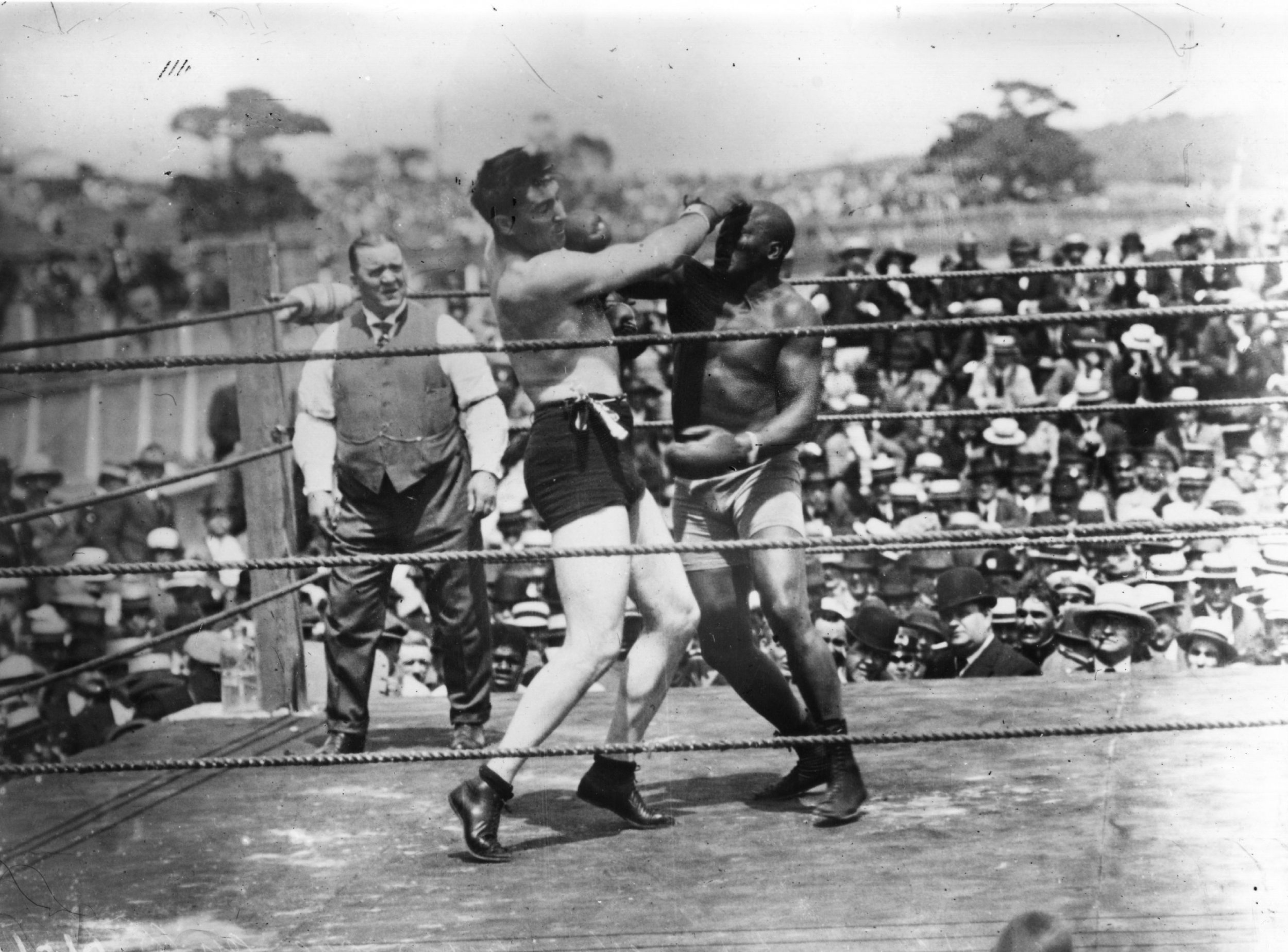
On Saturday, President Donald Trump said via Twitter that he's considering a "full pardon" of Jack Johnson, the world's first black heavyweight champion during the Jim Crow era, who was arrested for his relationships with alleged prostitutes in 1912.
"Sylvester Stallone called me with the story of heavyweight boxing champion Jack Johnson. His trials and tribulations were great, his life complex and controversial. Others have looked at this over the years, most thought it would be done, but yes, I am considering a Full Pardon!" the president tweeted.
Sylvester Stallone called me with the story of heavyweight boxing champion Jack Johnson. His trials and tribulations were great, his life complex and controversial. Others have looked at this over the years, most thought it would be done, but yes, I am considering a Full Pardon!
— Donald J. Trump (@realDonaldTrump) April 21, 2018
Born on March 31, 1878, in Galveston, Texas, Johnson became a rising star in the realm of boxing. He won the Texas State Middleweight title as a professional athlete, and later he became the World Colored Heavyweight Championship between 1903-1908. But his biggest prize came on December 26, 1908, when he defeated Tommy Burns for the World Heavyweight Championship near Sydney, Australia. He beat the defending champion in 14 rounds until authorities had to intervene and stop the bout.
He repeatedly challenged Jim F. Jeffries until the white boxer finally accepted. Coined the "Fight of the Century," Jeffries lost to Johnson on July 4, 1910, in Reno, Nevada, after 15 rounds. While Jeffries humbly admitted his defeat, Johnson's win enraged white boxing fans.
His rise occurred in the midst of the Jim Crow era, where the lynching of black men was all too common. Boxing businesspeople and reporters were hoping to find the "Great White Hope" to defeat the black boxer. Jess Myron Willard was capable of beating Johnson in Havana, Cuba, in April 1915 in the 26th round, the New York Post reported.
But his relationships with white women made him a notorious man at the time. In 1912, he was arrested and accused of transporting a white woman for "immoral purposes" according to The Chicago Tribune. Persecutors cited the Mann Act, a federal law that sought to prevent the trafficking of women for prostitution. Even though his relationships with two alleged prostitutes occurred before the act's approval in 1910, an all-white jury found him guilty in 1913—and Johnson was sentenced to a year in prison. However, he skipped bail with one of the women involved, Lucie Cameron, and traveled to Montreal, Mexico, Europe and South America for years, the Post added.
He finally returned to the U.S. in 1920 to face charges. After serving out his year-long sentence, he boxed for a couple years, but a car accident ended his life in 1946. To date, his criminal record has not been cleared.
Decades after his demise, supporters of the black boxer created campaigns to seek his pardon during the George W. Bush and Barack Obama years. Since 2004, Republican Senator John McCain from Arizona has backed a Johnson pardon, and legendary boxer Mike Tyson opened a Change.org petition asking Obama that Johnson should receive a posthumous pardon.
Sixty-one-year-old Linda E. Haywood, Johnson's great-great niece, told the Associated Press that "knowing that he was treated unfairly and unfairly convicted and targeted because of his choice of companions, who happened to be Caucasian, that's wrong." She later added that "the last thing you want to do is die and have your name tarnished. That's wrong." Haywood, alongside other Johnson's relatives, is asking Trump to grant him a pardon.
Posthumous pardons are rarely given, but they occurred from time to time. In 1999, President Bill Clinton pardoned Henry O. Flipper, the first African-American officer to graduate from West Point in 1877, after being unjustly accused of embezzlement. Flipper gained his pardon fifty years after his death, according to The New York Times.
According to the Department of Justice website, "it is the general policy of the Department of Justice not to accept for processing applications for posthumous pardons for federal convictions. The policy against processing posthumous pardon petitions is grounded in the belief that the time of the officials involved in the clemency process is better spent on the pardon and commutation requests of living persons."
Nicknamed "the Galveston Giant," Johnson was the son of former slaves and the third of nine children. According to website Biography.com, he "possessed an air of confidence and drive to exceed beyond the hardscrabble life his parents had known."
Uncommon Knowledge
Newsweek is committed to challenging conventional wisdom and finding connections in the search for common ground.
Newsweek is committed to challenging conventional wisdom and finding connections in the search for common ground.
About the writer
Robert Valencia is deputy world editor for Newsweek. Robert has covered issues related to drug policy, human rights, U.S. presidential ... Read more
To read how Newsweek uses AI as a newsroom tool, Click here.








